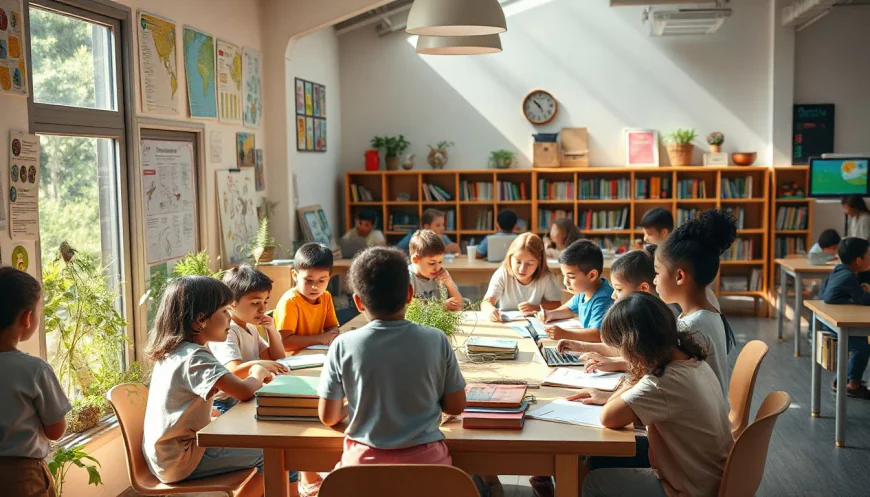Education Is Not Preparation for Life; Education Is Life Itself
Imagine a world where learning is not just about passing tests or earning diplomas, but about living fully every day. Education’s true power goes beyond school walls—it's woven into the very fabric of our everyday moments. Many think of education as a stepping stone that helps us succeed someday. But what if it’s actually the foundation of how we live, connect, and grow? Recognizing this shifts how we see ourselves and our world. When we realize education is life itself, we unlock endless opportunities for personal and social development.

The Conceptual Shift: From Preparation to Embodiment of Life
Understanding the Traditional View of Education
For generations, most people saw education as a tool for future success. It’s taught as a way to prepare for careers, wealth, or status. This means people often see school as a means to an end—something you do now, so you can succeed later. But this view has limits. When education is only about reaching a goal that’s far away, the moment for learning can be missed. It’s like seeing a meal only as fuel for tomorrow’s workout—missing the nourishment it provides today.
Redefining Education as a Lifelong Process
Instead, think of learning as a way of life. Every experience offers a chance to discover something new. Whether it’s fixing something around the house or talking with a neighbor, we’re always learning. This ongoing process shapes us into better thinkers, helpers, and problem-solvers. When education is part of daily life, it encourages us to grow mentally, emotionally, and socially every step of the way.
Expert Perspectives
Great thinkers like John Dewey and Paulo Freire believed learning should be active and connected to real life. Dewey said education is “life itself,” not just preparation for it. Freire emphasized that education happens through dialogue and experiences, not just listening to a teacher or reading textbooks. Their ideas show that learning is best when we participate actively, not just passively absorb information.
Education as a Fundamental Element of Everyday Life
Learning Through Daily Interactions and Experiences
Think about the skills we develop just from living. We learn cultural traditions by participating in them. We gain emotional intelligence from everyday conversations. Simple acts like negotiating a sale or solving a family problem teach us practical skills. These lessons stick because they happen naturally, not in a classroom. Experiential learning—learning by doing—helps knowledge stay with us longer and become useful.
Education in the Context of Community and Culture
Every community, big or small, shares its own lessons. Traditions, stories, and values act as everyday lessons. Indigenous communities, for example, have their unique ways of passing down skills and wisdom that last generations. When we honor these practices, we see education not as separate from life but as embedded in our culture. It keeps traditions alive and connects us to our roots.
Developing Critical Life Skills
Some skills help us handle life’s surprises—like managing money, communicating well, or solving problems. These are essential parts of daily education. To include more of these skills, try simple actions: set a weekly budget, practice active listening, or fix broken objects instead of replacing them. These routines turn everyday moments into lessons that prepare us for bigger challenges.
The Role of Formal Education in Reinforcing Life’s Continuity
Schools as Ecosystems of Lifelong Learning
Modern schools are shifting from rote memorization to real-world projects. Schools that involve community service or hands-on experiments make learning relevant. For example, community gardens or local business partnerships offer students practical experience. These methods build skills and mindset needed for lifelong learning.
Education as a Tool for Personal Empowerment and Social Change
When education helps us understand ourselves better, we become more aware of our feelings and values. It fosters empathy, making us more considerate toward others. Some programs focus on teaching students how to make a difference in their neighborhoods. These initiatives turn education into a tool for social change, building stronger, connected communities.
Building a Culture of Continuous Learning
Encouraging curiosity is key to lifelong learning. Read books that interest you, join online groups, or attend local workshops. Stay open to new ideas, and don’t wait for school to start. When learning becomes a daily habit, life itself becomes your classroom.
Challenges and Opportunities in Recognizing Education as Life Itself
Common Barriers to Viewing Education as an Ongoing Process
Many societies put too much emphasis on grades and certificates. This focus can make learning feel like a box to check, not a journey. Also, not everyone has access to resources like books, classes, or internet, which limits lifelong learning. These obstacles can make it seem like education is only for certain people, not everyone.
Leveraging Technology and Innovation
The good news is that technology creates new ways to learn. Podcasts, online courses, and virtual communities make education accessible everywhere. Best of all, many resources are free or affordable. For example, watching YouTube tutorials can teach you everything from cooking to coding. Small daily steps, like listening to an educational podcast during a commute, add up fast.
Policy and Educational Reform Directions
To make lifelong learning a reality for more people, communities and governments need to support flexible, inclusive programs. Policies should promote experiential and community-based learning. Schools and organizations can work together to create programs that reach beyond traditional classrooms, making education part of the fabric of daily life.
Conclusion
In the end, education is not just something we do to prepare for the future — it is how we live each day. Every moment offers a chance to learn, grow, and connect with the world around us. When we view education as life itself, we become more fulfilled and resilient. Society benefits too, as more people bring their best selves forward. So, embrace every experience as an educational opportunity. Every day holds the potential to teach us something new, keep us curious, and make life richer. Let’s make learning a lifelong adventure, starting today.



 VARSHITHA
VARSHITHA